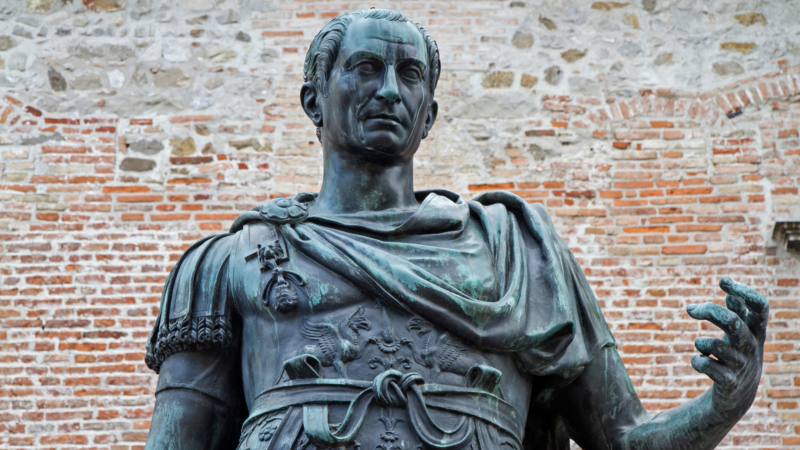Thanks to Shakespeare, everyone knows the name of Julius Caesar, the ancient Roman stabbed to death on the Ides of March by those he trusted. But why did Caesar have to die?
As a successful military leader, Caesar rose to power in a short amount of time, intimidating the Senate. They worried that he wanted to abolish the Senate and hold all political power for himself (like the kings that had originally ruled Rome).
The first Triumvirate
Caesar became consul in 59 BC and formed an informal alliance, also known as the First Triumvirate with Crassus and Pompey. His expeditions to Britain and the conquest of Gaul brought all of western Europe under Roman control. He was a brilliant military leader, often compared to Alexander the Great. The senators realized that he was becoming a real threat to them.
Crossing the Rubicon
Pompey was appointed sole consul to deal with the problem and ordered Caesar to disband his army, but instead Caesar led a legion across the Rubicon, Italy’s northern border and onto Rome. This was a declaration of war, as commanders could not lead their armies into Italy. Pompey and the Senate escaped from Rome but Caesar followed and after defeating Pompey’s army declared himself dictator for life in 45 BC. He was not an emperor but a republican dictator as Rome wasn’t yet an empire. After he was elected consul again, he gave up the dictatorship and the Senate returned.
Back in power
Many of his acts hint that he wanted to become king. He even wore a royal crown during a religious festival once*. He traveled to Egypt to find Pompey (Caesar arrived just after Pompey had died) where he started an affair with Queen Cleopatra.

At home, he launched a series of political and social reforms which brought him more support from the people. Caesar was becoming so powerful that the senators decided the time had come to act.
Caesar dies

On the 15th of March 44 BC, more than 20 senators stabbed him to death. The murder took place in the Senate House in Pompey’s theatre complex; the remains of this building still exist at modern-day Largo Argentina in Rome. As Caesar entered the Senate House, he was suddenly surrounded and stabbed 23 times.
Caesar’s dead body was taken to the forum by his supporters and was cremated there with great ceremony. Later, Julius Caesar became the first Roman to be deified. This started the new tradition of deifying important Roman people, such as emperors and their families after their death.
After Caesar’s death
The murder of Julius Caesar didn’t bring peace and freedom to Rome as the Senators expected. What it brought instead was a long civil war.
In 29 BC Augustus, Rome’s first Emperor and Caesar’s adoptive son and heir, built a temple to the Divine Julius on the exact spot where his body was cremated. The foundations of the temple still exist today in the center of the forum and people still leave flowers, notes, and coins in commemoration of the most famous Roman leader.

*Beard M, SPQR A History of Ancient Rome, Profile Books LTD, London, 2016, P. 59





